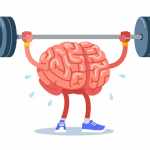Have you ever wondered what is going on in your brain while you are off in dreamland fast asleep? The body may be still and motionless, but your mind is completing vital recovery processes. While we sleep, the brain is strengthening neural pathways between cells and creating new ones. This restorative effect of sleep improves cognitive function, keeping you mentally sharp during the day. The rate at which we learn and our ability to focus and concentrate is profoundly influenced by how much sleep our brain receives every night.
What Happens When We Sleep?
Research has shown that the brain flushes out toxins and clears molecules associated with degeneration of brain cells. As we sleep, our brain regenerates cells and helps to keep neurological disorders such as Parkinson’s disease and Alzheimer’s at bay.
The Effect of a Sleep Deprived Brain
Depriving the brain of sleep results in a wide variety of adverse health effects. The brain slows down, thinking becomes foggy and reaction time degrades. You may find that you are overly aggressive or grumpy and likely to snap at someone. Tasks that require concentration, such as driving, become incredibly challenging to do correctly. Severe sleep deprivation results in visual delusions and hallucinations.
Sleep deprivation affects decision making, and you are more likely to agree to things that you would typically avoid. Risk taking also increases as the brain is deprived of its ability to calculate dangerous situations and react to them. Sleepy drivers perform in the same manner behind the wheel as people that are drunk.
Why You Need a Good Night’s Sleep
There are so many reasons why you need a good night’s sleep. The mood is influenced by the amount of rest you receive, and when you have had an uninterrupted eight hours sleep, you will notice that you feel happy and positive about the world around you. The hormonal system is hard at work as we sleep; the body is flooded with human Growth Hormone (HGH). This potent hormone repairs the physical and mental stresses on the body and prepares the body for the next day to come.
Getting a good night sleep can reduce the effects of depression. Depression can increase anxiety and insomnia, disturbing the circadian rhythms of the body. Getting enough sleep can assist in reducing the signs and symptoms of depression.
Tips for Getting a Good Night’s Sleep
#1 Buy a Comfortable Mattress
We spend eight hours or more between the sheets every night. Investing in a comfortable and supportive mattress is the first place you should start in trying to get a good night’s rest.
#2 Take a Hot Shower before Bed
Raising your body temperature with a hot shower before bed will help your muscles relax and refresh your mind.
#3 Take a GABA Supplement
This herbal supplement will increase the production of serotonin in the brain, a sleep hormone that helps you drift off. GABA also increases the body’s ability to produce and release HGH.
#4 Don’t Drink Fluids before Bed
There’s nothing worse than breaking your sleep to go to the bathroom in the middle of the night. Broken sleep is not as restorative as unbroken sleep, so lay off the tea before bedtime.
#5 Visit a Medical Professional
If you still have problems sleeping, you may have a disease or disorder that is preventing you from getting the right amount of sleep. Visit your doctor for a sleep assessment.
The Final Thought
We need sleep to survive, do everything you can to ensure that you get your rest. Use these few tips to help you sleep peacefully every night.







